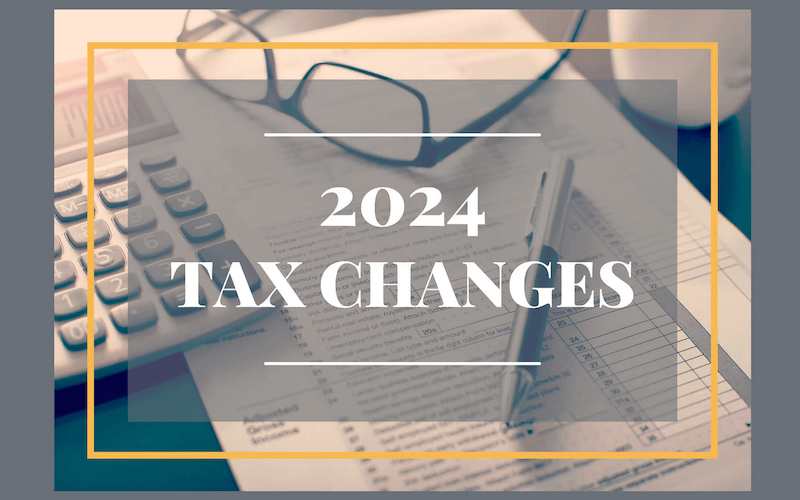The Internal Revenue Service (IRS) has just released its annual inflation adjustments for tax year 2024. These adjustments include changes to tax rate schedules and other tax provisions, providing important information for taxpayers. Let’s take a closer look at what’s new for the upcoming year.
New Adjustments for 2024

Starting in 2023, the Inflation Reduction Act reinstates the Hazardous Substance Superfund financing rate for crude oil received at U.S. refineries and petroleum products entering the United States for consumption, use, or warehousing. This tax rate is based on the sum of the Hazardous Substance Superfund rate and the Oil Spill Liability Trust Fund financing rate. In 2024, the Hazardous Substance Superfund financing rate will be adjusted for inflation. For crude oil or petroleum products entered after December 31, 2016, the tax rate will be $0.26 cents per barrel.
Key Changes for Tax Year 2024
The adjustments for tax year 2024 outlined in Revenue Procedure 2023-34 are of great interest to most taxpayers. Here are some of the highlights:
- Standard Deduction: The standard deduction for married couples filing jointly will rise to $29,200, a $1,500 increase from tax year 2023. For single taxpayers and married individuals filing separately, the standard deduction will be $14,600, a $750 increase. Heads of households will have a standard deduction of $21,900, an increase of $1,100 from tax year 2023.
- Marginal Tax Rates: The top tax rate remains at 37% for individual single taxpayers with incomes exceeding $609,350 ($731,200 for married couples filing jointly). The other rates range from 10% to 35%, depending on income levels.
- Alternative Minimum Tax (AMT) Exemption: The AMT exemption amount for tax year 2024 is $85,700, beginning to phase out at $609,350 ($133,300 for married couples filing jointly, phasing out at $1,218,700).
- Earned Income Tax Credit (EITC): The maximum EITC amount for taxpayers with three or more qualifying children will be $7,830, an increase from $7,430 in tax year 2023.
- Transportation and Parking Benefits: The monthly limitation for qualified transportation fringe benefits and qualified parking will increase to $315 for tax year 2024.
- Health Flexible Spending Arrangements (FSA): The dollar limitation for employee salary reductions for contributions to health FSAs will increase to $3,200 for tax year 2024. The maximum carryover amount for unused amounts in cafeteria plans will be $640.
- Medical Savings Accounts: Self-only coverage in a Medical Savings Account will require an annual deductible of at least $2,800, up by $150 from tax year 2023. The out-of-pocket expense amount will be $5,550 for self-only coverage and $10,200 for family coverage.
- Foreign Earned Income Exclusion: The foreign earned income exclusion will be $126,500 for tax year 2024, an increase from $120,000 in tax year 2023.
- Estate Tax: Estates of decedents who die in 2024 will have a basic exclusion amount of $13,610,000, up from $12,920,000 for those who passed away in 2023.
- Gift Tax Exclusion: The annual exclusion for gifts will increase to $18,000 for calendar year 2024, up from $17,000 in calendar year 2023.
- Adoption Credit: The maximum credit allowed for adoptions in tax year 2024 will be up to $16,810, an increase from $15,950 in 2023.
Items Not Affected by Indexing
Certain items, as specified by statute, will not be adjusted for inflation. These include:
- Personal Exemption: The personal exemption for tax year 2024 will remain at 0, as it has been since 2023.
- Itemized Deduction Limitation: There will be no limitation on itemized deductions for tax year 2024, continuing the elimination of this limitation by the Tax Cuts and Jobs Act.
- Lifetime Learning Credit: The modified adjusted gross income amount used to determine the reduction in the Lifetime Learning Credit will not be adjusted for inflation for taxable years beginning after December 31, 2020.
Q: How do these adjustments affect me?
A: These tax inflation adjustments for 2024 provide important information for taxpayers, including changes to tax rates, deductions, credits, and other provisions. It is crucial to stay updated on these adjustments to accurately file your income tax returns.
Q: Are these adjustments final?
A: While the IRS has announced these inflation adjustments, it is essential to stay informed about any potential changes or clarifications that may arise before the tax filing season begins.
The IRS has released the tax inflation adjustments for 2024, informing taxpayers about changes to tax rates, deductions, and other provisions. These adjustments play a vital role in determining the tax liabilities of individuals and businesses. Stay updated and consult with a tax professional to ensure accurate filing and compliance with the latest tax regulations.
Sources:

